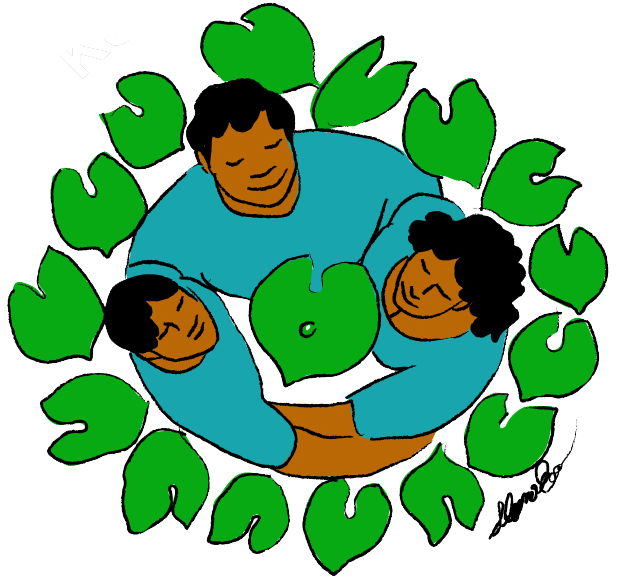Shaping Cultural Identity Through Story
KKV’s Story Project was initiated in 2021 to build on the intimate connections among health, resilience, and cultural, familial and community grounding which are at the center of KKV’s approach to health. For many Pacific Island cultures, storytelling has long been the medium for preserving cultural tradition and meaning. From creation to navigation tales, the oral tradition helps to shape cultural identity.
The Story Project students gather for a quick photo in their classroom at Dole Middle School. Photo provided by Rona Mangayayam.
The Story Project focuses on educating kids through language and stories. Mark Tang, kumu hula and cultural advisor, and Innocenta Sound-Kikku, youth leader of Pacific Voices, lead three 7th grade Social Studies classes at Dole Middle School each week. Their program teaches youth to read, write, illustrate, and perform the stories of their ancestors, who believed that it is not enough to merely read a story—one must live the story to perpetuate it. They bring to life language and cultural heritage that would otherwise be lost in the school environment and aim to give youth inspiration from the past as a means of building identity and self-confidence to move forward.
The Story Project emphasizes cultural pride, which is of utmost importance for students’ physical, mental, and spiritual health. Youth in Kalihi often reject their cultural identity out of the desire to find acceptance within the larger community. Many Kalihi students are bullied and targeted as new immigrants. One lesson both Tang and Sound-Kikku teach is the aloha chant, which involves discussing how kupuna view aloha and how chants can be used to help themselves. Students are also taught the specific names of the land, mountains, and water systems of Kalihi, locating them in a place that was formed by generations of Pacific Island ancestors.
Students at Dole Middle School settle in for their weekly lesson from The Story Project facilitators.
Kumu Mark teaches youth about the ways that Native Hawaiians were attuned to the moon cycles, knowing the best days for productivity. Sound-Kikku invites Micronesian leaders in the community to tell stories to inspire and encourage students to pursue higher education. This is critical since many students do not have a vision for higher education, and the Story Project team wants to change this before kids get to high school where it is often too late to build the grades and other skills needed for college.
“I hope people can be inspired to see value in what KKV provides for the students in Kalihi,” says Tang. “The Story Project is one way that we are supporting social and mental health for the youth in our community.”






